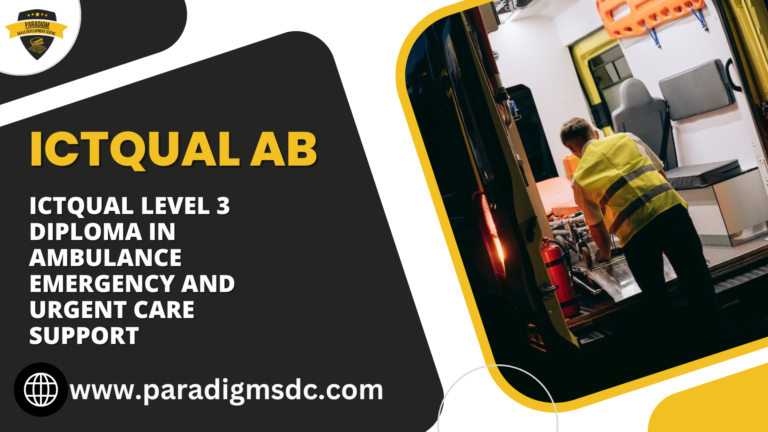Course Introduction
The ICTQual Level 3 Diploma in Forklift Safety Specialist (FSS) is designed for individuals seeking to enhance their knowledge and skills in forklift safety. This comprehensive course provides an in-depth understanding of safety protocols, operational standards, and regulatory requirements associated with forklift operations. It is ideal for those aiming to pursue a career as a forklift safety specialist or enhance their current role within the industry.
Course Overview
This diploma program covers a wide range of topics essential for ensuring the safe operation of forklifts in various industrial settings. The course combines theoretical knowledge with practical training to equip students with the necessary skills to manage and enforce safety standards effectively. Participants will learn about risk assessment, accident prevention, and emergency response procedures specific to forklift operations.
Course Study Units
- Introduction to Forklift Operations
- Forklift Safety Regulations and Standards
- Risk Assessment and Hazard Management
- Operator Training and Certification
- Safe Forklift Operations
- Forklift Maintenance and Inspection
- Emergency Procedures and Incident Response
- Ergonomics and Operator Health
- Technology in Forklift Safety
- Case Studies and Practical Applications
Learning Outcomes
Upon completion of the ICTQual Level 3 Diploma in Forklift Safety Specialist, participants will be able to:
Introduction to Forklift Operations
- Understand the various types of forklifts and their specific applications in different industrial settings.
- Identify and explain the basic components and controls of a forklift.
- Demonstrate foundational knowledge of the principles of forklift operation.
2. Forklift Safety Regulations and Standards
- Recognize and interpret national and international safety standards related to forklift operations.
- Explain the legal responsibilities of employers and operators concerning forklift safety.
- Ensure compliance with Occupational Safety and Health Administration (OSHA) guidelines and other relevant safety regulations.
3. Risk Assessment and Hazard Management
- Identify potential hazards associated with forklift operations in various environments.
- Conduct thorough risk assessments to evaluate and prioritize risks.
- Implement effective hazard control measures to minimize risk and enhance safety.
4. Operator Training and Certification
- Develop and implement best practices for training forklift operators.
- Understand the processes and requirements for operator certification.
- Evaluate and assess the competence and performance of forklift operators to ensure they meet safety standards.
5. Safe Forklift Operations
- Apply safe operating procedures and best practices in forklift operation.
- Demonstrate proper load handling techniques to maintain load stability and prevent accidents.
- Navigate forklifts safely in different work environments and under various conditions.
6. Forklift Maintenance and Inspection
- Perform routine maintenance procedures to ensure forklifts are in safe working condition.
- Use pre-operation inspection checklists to identify and address potential mechanical issues.
- Understand and manage the maintenance requirements for different types of forklifts.
7. Emergency Procedures and Incident Response
- Develop and implement emergency protocols for responding to forklift-related accidents.
- Apply first aid and medical response techniques in case of incidents.
- Document and report forklift incidents accurately and thoroughly.
8. Ergonomics and Operator Health
- Apply ergonomic principles to enhance the safety and comfort of forklift operators.
- Identify strategies to prevent operator fatigue and reduce the risk of injuries.
- Promote a healthy working environment that supports the well-being of forklift operators.
9. Technology in Forklift Safety
- Understand the latest innovations in forklift safety technology.
- Utilize telematics and monitoring systems to enhance operational safety.
- Evaluate the impact of automation and artificial intelligence on forklift safety and efficiency.
10. Case Studies and Practical Applications
- Analyze real-world forklift incidents to identify causes and preventive measures.
- Extract valuable lessons from industry case studies to improve safety practices.
- Apply problem-solving skills to practical scenarios, demonstrating mastery of course content.
Course Benefits
- Enhanced Safety Skills: Gain comprehensive knowledge and skills to improve forklift safety in your workplace.
- Career Advancement: Open doors to advanced roles in forklift safety and management.
- Industry Recognition: Earn a respected qualification that demonstrates your expertise in forklift safety.
- Practical Training: Benefit from hands-on training that prepares you for real-world scenarios.
- Compliance: Ensure your workplace meets regulatory requirements and industry standards.
Who is this Course For?
- Forklift Operators: Seeking to enhance their safety knowledge and skills.
- Safety Officers: Aiming to specialize in forklift safety management.
- Warehouse Managers: Looking to improve safety standards in their facilities.
- Logistics Professionals: Responsible for the safe operation of forklifts.
- Health and Safety Professionals: Wishing to expand their expertise in industrial safety.
Future Progression
After completing the ICTQual Level 3 Diploma in Forklift Safety Specialist, graduates can pursue advanced qualifications and career opportunities such as:
- Level 4 Diploma in Health and Safety Management
- Safety Manager: Overseeing safety protocols in larger industrial operations.
- Forklift Safety Trainer: Developing and delivering training programs for forklift operators.
- Health and Safety Consultant: Providing expert advice on forklift safety to various organizations.
The ICTQual Level 3 Diploma in Forklift Safety Specialist is a crucial step towards ensuring a safe and efficient working environment in industries that rely on forklifts. Enroll today to take your career in safety management to the next level.







